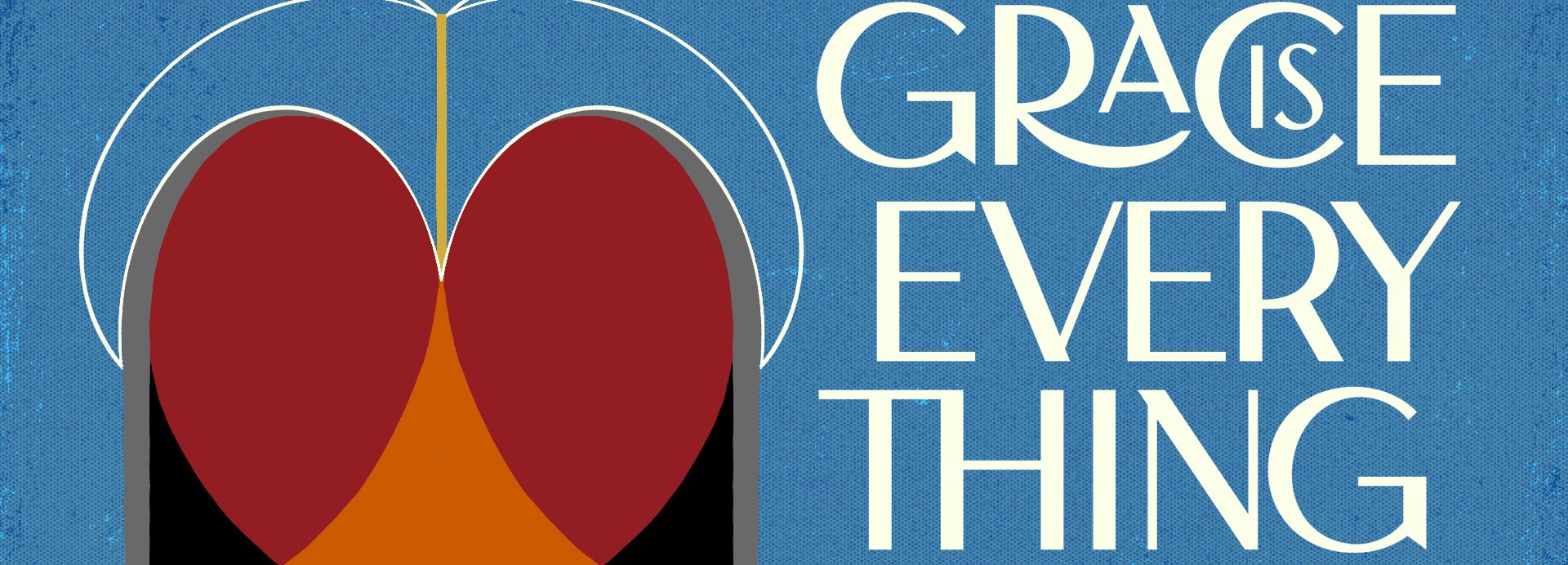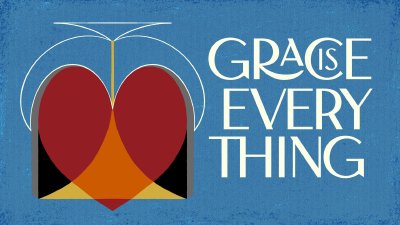


Grace Is Everything
The Fight of Your Life
May 2, 2021 • Rev. James M. Holland • Galatians 5:16–21
While our culture, increasingly dissatisfied with the mundane, continues to encourage us to seek out the new and the novel, more often than not the Bible tells us, in our dissatisfied moments and struggles, to remember. This is a constant theme in the Psalms, for instance, as often when the psalmist is in deep lament the thing that brings him out of his malaise is to remember what God has done for him. There is never a Pollyanna answer to our suffering and sin, rather we are told to behold who God is and what he has done. Remember who you are. Paul does the same thing in Galatians as he encourages some believers who started well, but now find themselves in a quagmire of trouble. In our passage for Sunday we see a realistic exposition on how to thrive in the new life we have in Jesus. I say realistic because becoming more like Jesus (which is to find real freedom) is not a straight line, nor do we always feel like we are actually making progress. It is also a fight––the fight of your life. While we do have a great inheritance in Jesus, we still carry our sinful nature with us. It is an ever-present reality and an imposing reality. And yet the Bible says we have everything necessary for finding abundant life in Jesus, even and especially among the ruins of the culture around us. This is so important because we are told everywhere in Scripture to continue to “build gardens in Babylon,” which is an apt metaphor for what Christian growth looks like. He actually calls transformation in an ordinary believer “the fruit of the Spirit.” I stepped into this passage on Monday morning after dealing with some particular “besetting” sin in my life that had me literally in the fetal position. I was bewildered, wondering if there was any hope for me. And this passage was like smelling salts for my weary soul. And, yes, there is hope for me and all who are weary and heavy-laden! Join us Sunday, live and in person or via livestream. Also join us for Sunday School! This will be our last week for both Children’s and Adult Sunday School as we move into summer rhythms. Blessings, Jim
Grace and Peace
February 21, 2021 • Rev. Joshua Smith • Galatians 1:1–10
Man, it was a welcome change to cancel things for reasons other than the pandemic! This was a week filled with surprises and adventure for our family, which is another way of saying, inconveniences and extreme discomfort. It’s always both, isn’t it? The thrill and wonder of record-breaking flurries alongside the burdens of heartache and grief. Snow angels and frostbite. Our family lost a dear mentor this week as well as a cousin in his early twenties, just days apart. We were unable to travel and mourn with family and friends the way we wanted to, but we’re also grateful for technology that provided some consolation and connection. We had to change our plans for birthdays and miss out on our Mardi Gras and Ash Wednesday plans entirely. But there was sledding and cake! Not a day goes by that we aren't grateful for our whiteboard calendar, so easily amended. I was reminded of a bit in C.S. Lewis’ fantasy novel Perelandra this week as we once again had the terrible privilege of explaining to children that plans had changed. In the book, Dr. Ransom finds himself a tourist on a beautiful, newly created planet, unburdened by sin. At one point he has a conversation with one of the unfallen humans about how he’s looking for a certain kind of fruit he’d stumbled upon earlier. The alien Eve then responds wisely, “You could send your soul after the good you had expected, instead of turning it to the good you had got. You could refuse the real good; but you would make the real fruit taste insipid by thinking of the other...” Boy, I wish our own Eve and that guy I see in the mirror every day could have learned this lesson the easy way. We ruin the good God has provided for us by insisting in our hearts that we have a right to the good we had expected. This year, our Lenten season dovetails with a stretch of the New City Catechism focused on the Law. Bummer upon bummer, am I right? Surely, we’ve had a whole Lenten year filled with fasting from our favorite things! Can’t we just take a break from the downers? I’m sympathetic to this view, personally. And yet, I also wonder if there isn’t a deeper kind of joy awaiting us if we can simply receive the given good. Our new series on Galatians is called “Grace Is Everything,” and I can’t wait to begin this conversation about how the Law, like so many other things, can be a good means of grace as long as we don’t try to replace the gospel with it! I truly believe there is genuine, abundant grace hidden just under a layer of soft, powdery inconvenience, if only we would grab some mittens and a shovel and begin to dig. Speaking of inconvenience, we have some faithful members clearing out the parking lot on Saturday and plan to have it ready for in-person attendees at worship, but we’ll make a final call on Saturday and let you know. Our service this weekend will be livestreamed at the very least. We also get to install two elders to our active Session, so we’re excited to celebrate with you all! - josh
Restore Them Gently
May 9, 2021 • Rev. Joshua Smith • Galatians 6:1–10
The United States birth rate has declined again, calculated now at about half the replacement rate. At this scale, within decades either America’s overall population will plummet, or else native-born Americans’ relationship to first-generation immigrants will flip. The consequences of either scenario would be bleak for political stability. What happened? Certainly, the pandemic has had its effect, but this deterioration is on a much longer and more consistent trajectory than those factors can account for. The single overarching reason for low birth rates is this: given more agency, people are simply choosing not to have children. It makes sense – bearing and raising multiple children is difficult and scary and costly work, most of all for the women involved. It requires a level of sacrifice that is simply inconceivable in the imaginative economy of most modern people. But how precious the gift! Maternity is something Scripture shows God really cares about. It’s woven into the fabric of reality at the most fundamental levels. Everyone reading this has had a mother, and the nature of that primary relationship has defined the boundaries and set the agenda for nearly every other relationship in your life. And yet still, the more precious a thing is to you, the more potential it has to be a source of searing pain. So, because maternal relationships are so valuable, few wounds are as injurious as the loss of or estrangement from one’s mom, nor the grief of infertility, nor the unspeakable tragedy of a mother losing a child. Understandably, then, many would prefer not to be reminded at all of such things. A sense of compassion might lead some to avoid all talk of Mothers’ Day altogether and forge ahead with regular Sunday worship. Certainly, the historic potency of such “Hallmark” holidays has been significantly diluted in an era where every other day is designated in honor of something. We might be able to get away with ignoring Mothers’ Day altogether in a few years when the second Sunday in May is surrendered to something more asinine, like National Polyester Day. So, Mothers’ Day isn’t a part of the church calendar. But it’s on people’s hearts and minds this weekend anyway. In a fallen world, all that probability for pain and fear and woundedness that accompanies all the sacred blessedness of maternity is a powerful occasion to surrender ourselves, our broken hearts especially, to the God who created motherhood in his image and can be trusted to give us life; to shelter us under outstretched wings; to clean the scrapes and kiss the bruises; to lift up a caring countenance and grant us peace. And much of the time this is done in space and time through the local members of Mother Church. That’s what Paul is getting at in our text this week – what does it look like for a group of believers to restore one another with a spirit of gentleness? Well, it looks a lot like an attentive and attuned mother. I hope you’ll join us. - josh
The Key to Everything
May 16, 2021 • Rev. James Holland • Galatians 6:11–18
The French have a word for the special conditions of environmental elements that make possible the growing of certain things—that is, the soil, the climate, humidity, the length of growing season, etc. They call it terroir. The terroir of a place is what makes it unique, unlike any other place. As a gardener, I have learned the hard way that one must respect this. I am not free to walk into my garden and plant anything I jolly well please. No, long before I arrive, with all my expectations, hopes and dreams of what gardening is, I must love, respect, and learn the unique terroir of my place. For instance, the terroir in Cuba is perfect for tobacco. The terroir in California in Napa Valley is perfect for grapes. The Delta has a terroir perfect for cotton and, yes, my garden has its own unique terroir. Every place has a terroir. This past weekend I used that image to tell my son and his bride that every marriage has a terroir as well. Two people—coming from different soils of life and experience—are going to create something unique and life-giving. They will not cease to be who they are, but together they will be more than they were. So I brought soil from my garden, Patrick’s place, and Jessica, his bride, brought soil from where she grew up, and we planted a tree. It was messy and glorious! In sign and symbol, we were trying to get at both the hard truth and glory of this new reality of marriage. I mean, when we come to great mysteries like marriage, words are too cheap, and so we reach for metaphor, poetry, and symbol to express what is ineffable. In our passage this week in Galatians, Paul is doing something similar. There is a unique terroir that a Christian is planted into (or more accurately, this terroir was planted into him/her). It is so unique that, if you add anything to it, you do not just diminish it, you destroy it. For Paul and throughout the Bible—it is the cross! The cross is so singular, so counter-intuitive, so against the rebellious human heart, that even when we know this to be true, we still try to add to it. And yet to do so will not just diminish us, but doom us. That will be Paul’s parting shot as he closes this pastoral letter to folk he dearly loves! Join us Sunday as we close out this thrilling, breathtaking exploration of the cross as the thing we boast in, glory in, wonder in, and walk in. I hope to see you live and in person, but if you can’t join us at our gathered table, join us via livestream. I can’t wait to dive in! Blessing, Jim
For Freedom
April 18, 2021 • Rev. James M. Holland • Galatians 5:1–6
Paul says perhaps one of the more shocking things in our passage this week. “For freedom Christ has set us free.” What Jesus has done in his saving life and death is for our freedom. If I were to poll most people in our community, both pagan and believer, and ask, “What was it that Christ did for you on the cross?”, I doubt I would get many people who would say, “To make me free, of course.” No, there lurks in the back of our minds, even among those who know Jesus, that Christianity brings at least some form of burden and bondage––after all, there are things he tells us we can’t do. To think in that vein is to already be implicated in the cultural definition of freedom as being more of a matter of personal choice with the trappings of authority removed. If Paul is right, we either have to rethink freedom according to Jesus or go with the cultural zeitgeist. The Bible story, however, is one of freedom and liberation. We have been set free! This only makes sense to us against the backdrop of the historic Fall, where none of us is even free to choose the good! On Sunday, with the help of the New City Catechism questions 14 and 15, we will seek to clear the lens and “see” freedom against the backdrop of our design. In other words, if there is no such thing as a created “human nature,” then by all means personal choice must become god. But if we have a nature that is fallen and in need of liberation, then the work of the cross becomes electric. I assure you, unless we grapple with the cultural view of freedom, we will all become slaves and that is the exact opposite what Jesus is all about! Join us Sunday, live and in person or via livestream, as we talk about Biblical freedom and the liberating effects of the cross. Blessings, Jim


